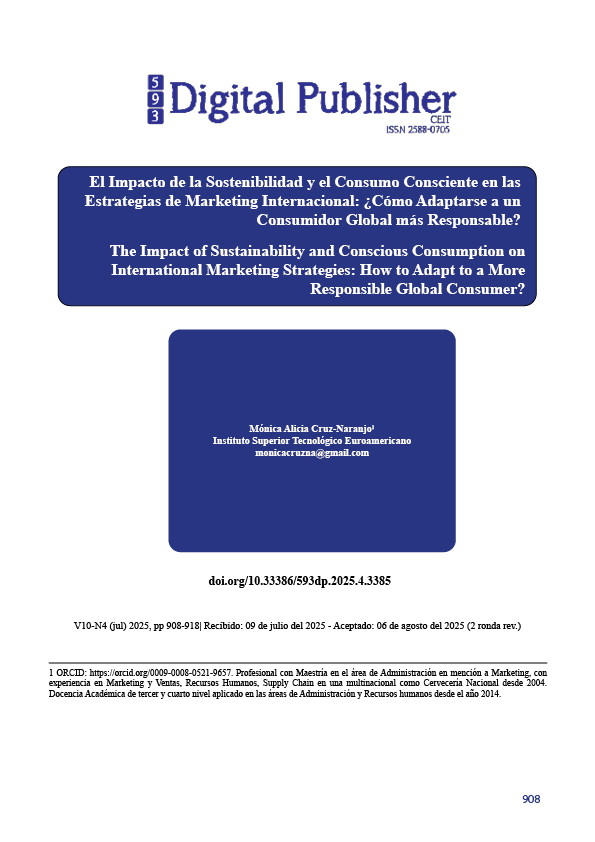The Impact of Sustainability and Conscious Consumption on International Marketing Strategies: How to Adapt to a More Responsible Global Consumer?
Main Article Content
Abstract
The article explores how growing environmental and social awareness among consumers is shaping international marketing strategies, forcing companies to adapt to a more responsible global consumer profile. The central question guiding this research is: how can companies integrate sustainability and conscious consumption into their international marketing approaches to maintain their competitiveness and reputation? The main thesis argues that marketing needs to evolve from a purely commercial logic to an approach that incorporates ethical, ecological, and social values. This study uses a mixed methodology: a systematic review of recent academic literature and a case study analysis of multinational companies that have adopted sustainable practices. Among the most notable findings is the growing demand for transparency, traceability, and authenticity in products, as well as a preference for brands that align with environmental and social causes. The article points to a significant impact on marketing strategies: there is an increase in investment in green communication, the redesign of sustainable products, and the use of eco-labels as tools for differentiation. In terms of business adaptation, it suggests a comprehensive transformation that includes sustainability in corporate culture, supply chain redesign, and market segmentation based on ethical criteria. The author concludes that only those companies that achieve true consistency between their actions and their messages will be able to consolidate their position in the face of increasingly informed, demanding, and conscious consumers.
Downloads
Article Details

This work is licensed under a Creative Commons Attribution-NonCommercial-ShareAlike 4.0 International License.
1. Derechos de autor
Las obras que se publican en 593 Digital Publisher CEIT están sujetas a los siguientes términos:
1.1. 593 Digital Publisher CEIT, conserva los derechos patrimoniales (copyright) de las obras publicadas, favorece y permite la reutilización de las mismas bajo la licencia Licencia Creative Commons 4.0 de Reconocimiento-NoComercial-CompartirIgual 4.0, por lo cual se pueden copiar, usar, difundir, transmitir y exponer públicamente, siempre que:
1.1.a. Se cite la autoría y fuente original de su publicación (revista, editorial, URL).
1.1.b. No se usen para fines comerciales u onerosos.
1.1.c. Se mencione la existencia y especificaciones de esta licencia de uso.
References
Anjorin, K. F., Raji, M. A., Olodo, H. B., & Oyeyemi, O. P. (2024). The influence of consumer behavior on sustainable marketing efforts. International Journal of Management & Entrepreneurship Research, 6(5). https://doi.org/10.51594/ijmer.v6i5.1128
Aragon, A., Dioso, D., & Melliza, M. (2024). The Untold Stories of Green Marketing: Combating Greenwashing and Promoting Genuine Sustainability. International Journal of Research and Innovation in Social Science, 8(11), 3559–3567. https://doi.org/10.47772/ijriss.2024.8110273
Balluchi, F., Lazzini, A., & Torelli, R. (2020). CSR and Greenwashing: A Matter of Perception in the Search of Legitimacy. Springer International Publishing. https://doi.org/10.1007/978-3-030-41142-8
Bowen, F., & Aragón-Correa, J. A. (2014). Greenwashing in Corporate Environmentalism Research and Practice: The Importance of What We Say and Do. Organization & Environment, 27(2), 107–112. https://doi.org/10.1177/1086026614537078
Drennan, T., Nordman, E. R., & Safari, A. (2023). Does a sustainable orientation affect global consumers’ relationships with international online brands? In International Marketing in the Fast-Changing World (pp. 219–236). Emerald Publishing. https://doi.org/10.1108/S1876-066X20230000037012
Edelman. (2021). Edelman trust barometer 2021. https://www.edelman.com/trust/2021-trust-barometer
Giraldo-Patiño, C. L., Londoño-Cardozo, J., Micolta-Rivas, D. C., & O’Neill-Marmolejo, E. (2021). Marketing sostenible y responsabilidad social organizacional: Un camino hacia el desarrollo sostenible. Revista Visión Empresarial, 9(1), 71–81. https://doi.org/10.15649/2346030X.978
Haigh, R., & Liszka, S. (2024). Greenwashing and greenhushing: Risks and opportunities from the gap between brand sustainability perceptions and performance. Journal of Brand Strategy, 13(3), 229. https://doi.org/10.69554/hagv7043
Hegemann, K. D. I., & Sohnrey, F. (n.d.). Comparative Study on Greenwashing in the Cosmetics Industry: A Content Analysis.
Kotler, P., Kartajaya, H., & Setiawan, I. (2019). Marketing 4.0: Moving from traditional to digital. Wiley.
Lyon, T. P., & Montgomery, A. W. (2015). The means and end of greenwash. Organization & Environment, 28(2), 223–249. https://doi.org/10.1177/1086026615575332
McKinsey & Company. (2020). The state of fashion 2020: Coronavirus update. https://www.mckinsey.com/industries/retail/our-insights/the-state-of-fashion-2020-coronavirus-update
Navaratne, A. (2023, August 25). Incorporating sustainability contexts in marketing. OSF Preprints. https://doi.org/10.31219/osf.io/djtvz
Najem, R., & Metcalfe, B. D. (2025). Greenwashing in the era of sustainability: A systematic literature review. Corporate Governance and Sustainability Review, 9(1), 18–31. https://doi.org/10.22495/cgsrv9i1p2
Navaratne, A., & Anthony, J. C. (2023). Methods of incorporating sustainability contexts in marketing and the expected response – A fuzzy approach. OSF Preprints. https://doi.org/10.31235/osf.io/kec8w
Nielsen. (2018). Global sustainability report. https://www.nielsen.com/wp-content/uploads/sites/3/2019/04/global-sustainability-report-oct-2018.pdf
Olson, E. (2022). ‘Sustainable’ marketing mixes and the paradoxical consequences of good intentions. Journal of Business Research, 143, 437–446. https://doi.org/10.1016/j.jbusres.2022.05.063
Parvatiyar, A., & Sheth, J. (2020). Sustainable marketing: Market-driving, not market-driven. Journal of Macromarketing, 41(2), 150–165. https://doi.org/10.1177/0276146720961836
Pinargote-Yepez, M., Guevara–López, S., & Rosero, M. (2024). Análisis de los consumidores y marketing sostenible: Una perspectiva hacia la responsabilidad ambiental y social. Revista Publicando, 11(1), 112–130. https://doi.org/10.51528/rp.vol11.id2401
Podolyanets, L. A., & Bakulin, N. K. (2024). Marketing strategy for promoting responsible consumption. Экономический Вектор, 3, 25–31. https://doi.org/10.36807/2411-7269-2024-3-38-25-31
Ramakrishna, G., & Rao, P. N. (2024). Exploring the Financial Ramifications of Green Washing in Corporate Practice: Unveiling the True Cost. Shanlax International Journal of Arts, Science and Humanities. https://doi.org/10.34293/sijash.v11is3-feb.7245
Rajagopal, A., Rajagopal, D., & Behl, R. (2020). Conscious consumption and marketing strategy. In R. Behl, A. Rajagopal, & D. Rajagopal (Eds.), Strategy, structure and corporate governance: An integrated view (pp. 179–199). Springer. https://doi.org/10.1007/978-3-030-516817
Shen, Y. (2024). Impact factors for sustainable consumption in today’s world. Advances in Economics, Management and Political Sciences, 114, 62–70. https://doi.org/10.54254/2754-1169/114/2024bj0147
Uralia, O. (2023). Consumer behavior and sustainable marketing. Revista Economică, 75(4), 29–37. https://doi.org/10.56043/reveco-2023-0034
White, K., Habib, R., & Hardisty, D. J. (2019). How to shift consumer behaviors to be more sustainable: A literature review and guiding framework. Journal of Marketing, 83(3), 22–49. https://doi.org/10.1177/0022242919825649
Wang, L. (2024). Sustainable marketing in Asian SMEs: Barriers and solutions. Asian Journal of Business Ethics.
Zuñiga Espinosa, N. A., Zamora Ramos, M. R., & Martínez García, M. D. (2023). Repensando el marketing para un desarrollo sostenible: Nuevos enfoques y estrategias. Boletín Científico de las Ciencias Económico Administrativas del ICEA, 12(23), 55–70. https://doi.org/10.29057/icea.v12i23.11961
Гончар, М., & Зеленевич, В. (2025). Інтеграція принципів сталого розвитку у маркетингові стратегії ІТ-компаній. Herald of Khmelnytskyi National University. Economic Sciences, 338, 75–85. https://doi.org/10.31891/2307-5740-2025-338-75


